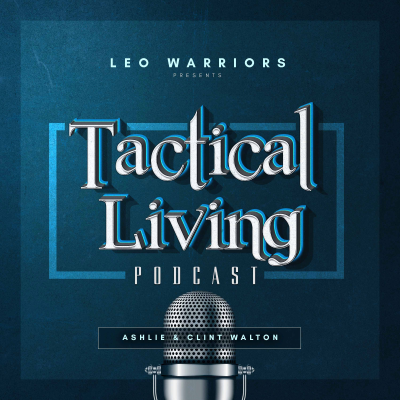
Höre Tactical Living
Podcast von Ashlie and Clint Walton
It’s hard to find balance in a high-stress career while managing everything else in life. That’s where Tactical Living Podcast comes in. Hosted by Ashlie Walton, a trauma recovery coach and tactical living expert, and Sergeant Clint Walton, this show offers practical advice for creating a well-balanced lifestyle, even amidst the demands of a first responder career. Three times a week, Ashlie shares insightful strategies on managing life’s challenges, such as what it’s really like to live as a police officer’s wife, while Clint joins the conversation several times a month to offer his perspective from the field. Together, they provide actionable tips on health, fitness, mental resilience, spiritual discipline, intimacy, and navigating the complexities of first responder life and relationships. Whether you’re seeking tactical approaches to personal growth or solutions to the unique challenges of law enforcement and first responder life, this podcast is for you. Want to be a guest on Tactical Living? Send Ashlie Walton a message on PodMatch, here: https://www.podmatch.com/hostdetailpreview/1594754484675x841981803913560400
Kostenlos testen für 30 Tage
4,99 € / Monat nach der Testphase.Jederzeit kündbar.
Alle Folgen
939 FolgenWhen your job becomes your identity, everything else fades into the background. In this episode, Coach Ashlie Walton and Sergeant Clint Walton guide first responders through the journey of rediscovering who they are beyond the uniform [https://geni.us/KqGS7i] (Amazon Affiliate—so they can build a more balanced, fulfilling life. 🔎 Episode Overview: Law enforcement and first responder work can easily consume your identity [https://hbr.org/2019/12/what-happens-when-your-career-becomes-your-whole-identity]. Over time, hobbies, friendships, and even your personality can get lost in the badge. This episode is a reminder that you’re more than your job. You’ll learn how to reconnect with your passions, strengthen relationships outside of work, and create a lifestyle that reflects your full self—not just your role. 🚨 5 Signs You’ve Lost Yourself in the Job 1. You Struggle to Answer “What Do You Do for Fun?” If your mind goes blank when asked this, it’s time to reconnect with your interests. 2. Your Entire Social Circle Is Work-Related Only surrounding yourself with coworkers can limit your perspective and growth. 3. You Don’t Prioritize Hobbies or Downtime If work always comes first, personal passions get pushed to the back burner. 4. Your Partner Says “You’re Always in Cop Mode” It’s hard to fully relax when your identity is always on-duty—even at home. 5. You Feel Lost During Time Off or After Retirement Without the structure of the job, you may not know who you are or what to do next. 🛠️ 5 Ways to Reclaim Your Identity Beyond the Badge 1. Revisit Old Hobbies or Passions What did you love doing before the job? Pick one and intentionally reintroduce it into your life. 2. Spend Time with Non-Work Friends or Family Building relationships outside of the job creates a healthier, more balanced social circle. 3. Schedule “You Time” That Has Nothing to Do with Work Whether it’s music, art, faith, hiking, or learning something new—carve out space just for you. 4. Reflect on Your Pre-Job Identity Journal about who you were before you became a first responder—and what parts of that person you want to bring back. 5. Start Saying “I Am” Without the Badge Practice defining yourself outside of your title: I am a father. I am an artist. I am someone who brings calm to chaos. 🎯 Why This Episode Matters You were someone before the job—and you’ll still be someone after. Reconnecting with your identity outside of your profession isn’t a luxury—it’s a lifeline. 🎙️ Listen now to rediscover the parts of yourself that make you whole, strong, and human—not just a first responder. 💥 Gear We Recommend for Our First Responder Community: 🛡️ Tactical storage made easy: STOPBOX – Buy One, Get One Free [http://stopboxusa.com/LEOWARRIORS] 🎯 Connect With Us: ✅ Join our Private Facebook Group for First Responders & Families [https://www.facebook.com/groups/POLICEFIREMILITARYFAMILIES] 🎥 Subscribe on YouTube [https://www.youtube.com/@therealleowarriors] for behind-the-scenes content and live interviews 🌐 Visit LEOWarriors.com [https://www.leowarriors.com] for coaching, resources, and more 💬 Listener Question: What’s one small act of service you can do today to honor someone who served? Let us know in the Facebook group or DM us on Instagram! Disclaimer: All viewpoints discussed in this episode are for entertainment purposes only and reflect our personal opinions based on our own experiences, background, and education. 🎙️ Want to be a guest on Tactical Living? Send a message to Ashlie Walton on PodMatch → Click here [https://www.podmatch.com/hostdetailpreview/1594754484675x841981803913560400] (Ad) Some product links in this episode may be affiliate links, which means we may earn a small commission if you make a purchase—at no extra cost to you. We only share products we genuinely believe in and trust. 📣 For PR, Speaking Requests, or Networking Opportunities: 📧 Email: ashliewalton555@gmail.com 📫 Mailing Address: P.O. Box 400115, Hesperia, CA 92340 🔗 Ashlie’s Facebook: facebook.com/police.fire.lawenforcement [https://www.facebook.com/police.fire.lawenforcement]
If you always say yes [https://geni.us/2Ua1kpI] (Amazon affiliate), eventually something—or someone—pays the price. In this episode, Coach Ashlie Walton and Sergeant Clint Walton break down why many first responders struggle to set boundaries and how learning to say no can protect your time, energy, and relationships. 🔎 Episode Overview: From mandatory overtime to endless family demands, first responders often feel like they don’t have permission to say no. The pressure to always be “on” can lead to burnout, resentment, and even physical exhaustion. This episode dives into the emotional and professional costs of overextending yourself [https://www.forbes.com/sites/bryanrobinson/2020/01/09/wasted-how-to-prevent-emotional-bankruptcy-when-youre-overdrawn-in-your-career/], and gives practical ways to reclaim your peace by saying no without guilt. 🚨 5 Signs You’re Saying “Yes” Too Often 1. You Feel Resentful After Agreeing to Something That sinking feeling after committing is a red flag that you didn’t actually want to say yes. 2. You Rarely Have Time to Rest If you can’t remember your last day off—or how to enjoy it—you’re overcommitted. 3. Your Relationships Are Suffering When you’re spread thin, your partner, kids, and even coworkers start to feel the disconnect. 4. You Say Yes Out of Guilt or Obligation If you’re afraid of disappointing people, you may be compromising your own well-being. 5. You Feel Invisible or Underappreciated When you’re constantly available, people start taking you for granted. 🛠️ 5 Tactical Ways to Set Boundaries Without the Guilt 1. Know Your Limits and Stick to Them Example: Cap your overtime shifts for the month—and honor that commitment to yourself. 2. Replace “I Can’t” with “I Don’t” “I don’t take calls after 7PM” is a boundary. “I can’t” invites negotiation. 3. Communicate with Confidence, Not Apology Saying no doesn’t require a long explanation. Be clear, kind, and direct. 4. Schedule Non-Negotiable Personal Time Put rest and recovery in your calendar like you would a shift or a court appearance—and guard it fiercely. 5. Practice Saying No in Low-Stakes Situations Start small: decline a meeting, pass on an invite, or ask someone else to take the lead. Build the muscle. 🎯 Why This Episode Matters Being available to others is part of the job—but you can’t pour from an empty cup. If you don’t learn how to set boundaries, your health, relationships, and career will pay the price. 🎙️ Listen now to learn how to say no without guilt—and why it’s one of the most tactical decisions you’ll ever make. 💥 Gear We Recommend for Our First Responder Community: 🛡️ Tactical storage made easy: STOPBOX – Buy One, Get One Free [http://stopboxusa.com/LEOWARRIORS] 🎯 Connect With Us: ✅ Join our Private Facebook Group for First Responders & Families [https://www.facebook.com/groups/POLICEFIREMILITARYFAMILIES] 🎥 Subscribe on YouTube [https://www.youtube.com/@therealleowarriors] for behind-the-scenes content and live interviews 🌐 Visit LEOWarriors.com [https://www.leowarriors.com] for coaching, resources, and more 💬 Listener Question: What’s one small act of service you can do today to honor someone who served? Let us know in the Facebook group or DM us on Instagram! Disclaimer: All viewpoints discussed in this episode are for entertainment purposes only and reflect our personal opinions based on our own experiences, background, and education. 🎙️ Want to be a guest on Tactical Living? Send a message to Ashlie Walton on PodMatch → Click here [https://www.podmatch.com/hostdetailpreview/1594754484675x841981803913560400] (Ad) Some product links in this episode may be affiliate links, which means we may earn a small commission if you make a purchase—at no extra cost to you. We only share products we genuinely believe in and trust. 📣 For PR, Speaking Requests, or Networking Opportunities: 📧 Email: ashliewalton555@gmail.com 📫 Mailing Address: P.O. Box 400115, Hesperia, CA 92340 🔗 Ashlie’s Facebook: facebook.com/police.fire.lawenforcement [https://www.facebook.com/police.fire.lawenforcement]
You’ve been trained to assess threats, make fast decisions, and communicate under pressure [https://geni.us/MDW3NtH] (Amazon affiliate)—but are you using those same tactical skills in your personal life? In this episode, Coach Ashlie Walton and Sergeant Clint Walton break down how law enforcement training can improve your relationships, parenting, and home life. 🔎 Episode Overview: First responders operate in high-stakes environments where precision, awareness, and control can mean life or death [https://www.patbenincasa-art.com/fill-to-capacity-podcast/calm-in-a-crisis-first-of-the-first-responders]. But when the uniform comes off, many forget to apply those same tools to their most important mission: their personal relationships. This episode reveals how tactical thinking—when applied off duty—can help reduce conflict, build stronger bonds, and create a more peaceful home life. 🧠 5 Law Enforcement Skills That Translate to Your Personal Life 1. Threat Assessment → Emotional Awareness Use your ability to read a situation to recognize tension in your partner or child—and de-escalate early. 2. Tactical Breathing → Emotional Regulation Just like in critical incidents, calming your body before you respond can stop arguments before they start. 3. Clear Communication Under Stress → Better Conflict Resolution Calling for backup at work requires clarity—so does working through tough conversations with your spouse or teen. 4. Scene Safety → Protecting Your Peace You check every door and scan every room at work. At home, this could mean guarding your time, setting boundaries, and making your home a safe emotional space. 5. Debriefing After Calls → Debriefing After Conflict Just like you review calls for learning, talking through disagreements at home can deepen trust and prevent future misunderstandings. 🛠️ 5 Tactical Tools to Strengthen Your Relationships 1. Pause Before Reacting A tactical pause at work can save lives. At home, it can save your marriage. Take a breath before responding when emotions run high. 2. Use Brief, Direct Language Say what you mean—clearly and calmly. Avoid sarcasm or passive-aggression, especially under stress. 3. Practice Situational Awareness at Home Notice when a loved one is off. Ask questions like, “You seem quiet today—what’s going on?” the same way you would check on a partner on shift. 4. Train Together Couples and families can role-play communication, take self-defense classes, or even do workouts together. Shared training strengthens trust. 5. Lead Like You Would on the Job Don’t save your leadership for the workplace. Use it at home to model responsibility, accountability, and emotional control. 🎯 Why This Episode Matters The skills that make you an asset in the field can make you a hero at home—if you know how to use them. By applying tactical training to your personal life, you can build stronger relationships, resolve conflict faster, and lead your household with confidence. 🎙️ Listen now to take command of your relationships—tactically and intentionally. 💥 Gear We Recommend for Our First Responder Community: 🛡️ Tactical storage made easy: STOPBOX – Buy One, Get One Free [http://stopboxusa.com/LEOWARRIORS] 🎯 Connect With Us: ✅ Join our Private Facebook Group for First Responders & Families [https://www.facebook.com/groups/POLICEFIREMILITARYFAMILIES] 🎥 Subscribe on YouTube [https://www.youtube.com/@therealleowarriors] for behind-the-scenes content and live interviews 🌐 Visit LEOWarriors.com [https://www.leowarriors.com] for coaching, resources, and more 💬 Listener Question: What’s one small act of service you can do today to honor someone who served? Let us know in the Facebook group or DM us on Instagram! Disclaimer: All viewpoints discussed in this episode are for entertainment purposes only and reflect our personal opinions based on our own experiences, background, and education. 🎙️ Want to be a guest on Tactical Living? Send a message to Ashlie Walton on PodMatch → Click here [https://www.podmatch.com/hostdetailpreview/1594754484675x841981803913560400] (Ad) Some product links in this episode may be affiliate links, which means we may earn a small commission if you make a purchase—at no extra cost to you. We only share products we genuinely believe in and trust. 📣 For PR, Speaking Requests, or Networking Opportunities: 📧 Email: ashliewalton555@gmail.com 📫 Mailing Address: P.O. Box 400115, Hesperia, CA 92340 🔗 Ashlie’s Facebook: facebook.com/police.fire.lawenforcement [https://www.facebook.com/police.fire.lawenforcement]
First responders may not notice when their trauma begins to wear down the people they love most. In this episode, Coach Ashlie Walton and Sergeant Clint Walton explore the subtle signs that your family may be silently suffering [https://geni.us/tFCT] (Amazon affiliate)—and how to reconnect before the damage becomes permanent. 🔎 Episode Overview: The stress of the job doesn’t stay at the station. Over time, mood swings, emotional numbness, or constant venting can create emotional distance between a first responder and their family. In this episode, we explore what happens when your loved ones grow weary of carrying your emotional burden—and how to reverse the silent fallout that can fracture your home life. 🚨 5 Signs Your Family Is Struggling with Your Trauma 1. They Avoid Asking About Your Day They’ve learned that even simple questions lead to negativity or emotional shutdown. 2. They Become Emotionally Distant [https://www.verywellmind.com/what-is-emotional-detachment-5121166] Spouses or children may start to pull back, sensing that they can’t compete with the weight you’re carrying. 3. Increased Arguments or Silence Tension builds quickly—or worse, nobody talks at all anymore. 4. Kids Start Acting Out or Avoiding You Children often respond to emotional stress in their environment through behavior changes. 5. Your Partner Expresses Burnout or Resentment They may say things like “I can’t keep doing this,” or start creating emotional distance to protect themselves. 🛠️ 5 Ways to Rebuild Connection and Ease the Emotional Load 1. Acknowledge the Impact Let your family know you see how your stress affects them. Validation opens the door to healing. 2. Establish a Transition Routine After Work Use music, prayer, a walk, or a workout to reset your mind before walking through the front door. 3. Set Boundaries Around Trauma Sharing Instead of trauma-dumping, ask if they’re emotionally available—or save the venting for a trusted peer or therapist. 4. Schedule Intentional, Lighthearted Time Together Do something that brings joy and laughter to your household—game night, movie night, or a family outing. 5. Get Outside Help Family therapy, chaplain support, or couples coaching can be transformative—especially when communication feels broken. 🎯 Why This Episode Matters You’re trained to handle trauma—but your family isn’t. The longer you ignore how your job is affecting them, the greater the risk of emotional fallout, relationship breakdowns, and isolation. This episode will help you recognize the damage early, take responsibility, and lead your family toward healing and connection. 🎙️ Listen now to begin rebuilding what matters most—before the damage is done. 💥 Gear We Recommend for Our First Responder Community: 🛡️ Tactical storage made easy: STOPBOX – Buy One, Get One Free [http://stopboxusa.com/LEOWARRIORS] 🎯 Connect With Us: ✅ Join our Private Facebook Group for First Responders & Families [https://www.facebook.com/groups/POLICEFIREMILITARYFAMILIES] 🎥 Subscribe on YouTube [https://www.youtube.com/@therealleowarriors] for behind-the-scenes content and live interviews 🌐 Visit LEOWarriors.com [https://www.leowarriors.com] for coaching, resources, and more 💬 Listener Question: What’s one small act of service you can do today to honor someone who served? Let us know in the Facebook group or DM us on Instagram! Disclaimer: All viewpoints discussed in this episode are for entertainment purposes only and reflect our personal opinions based on our own experiences, background, and education. 🎙️ Want to be a guest on Tactical Living? Send a message to Ashlie Walton on PodMatch → Click here [https://www.podmatch.com/hostdetailpreview/1594754484675x841981803913560400] (Ad) Some product links in this episode may be affiliate links, which means we may earn a small commission if you make a purchase—at no extra cost to you. We only share products we genuinely believe in and trust. 📣 For PR, Speaking Requests, or Networking Opportunities: 📧 Email: ashliewalton555@gmail.com 📫 Mailing Address: P.O. Box 400115, Hesperia, CA 92340 🔗 Ashlie’s Facebook: facebook.com/police.fire.lawenforcement [https://www.facebook.com/police.fire.lawenforcement]
First responders are natural storytellers—but some stories help us process trauma [https://geni.us/R8wS4bN] (Amazon affiliate), while others quietly reinforce it. In this episode, Coach Ashlie Walton and Sergeant Clint Walton explore the emotional impact of “war stories” and how to tell them in ways that heal rather than harm. 🔎 Episode Overview: Sharing stories from the job is a deeply ingrained part of first responder culture. These “war stories [https://www.iwm.org.uk/history]” can build camaraderie, honor difficult experiences, and even help others cope. But they can also become unhealthy loops that keep trauma alive or glorify the worst moments of the job. In this episode, you’ll learn how to recognize the difference—and how to use storytelling as a tool for connection, growth, and recovery. 💬 When Storytelling Helps 1. Builds Connection with Your Team Telling job-related stories can foster trust and shared understanding, especially in close-knit units. 2. Normalizes Emotions When shared intentionally, stories can validate emotional reactions to difficult calls and prevent isolation. 3. Teaches and Mentors Others For newer first responders, listening to war stories can offer lessons, caution, and perspective. 🚨 When Storytelling Becomes Harmful 1. Replays Trauma on a Loop Reliving the worst call repeatedly can keep the nervous system in a heightened state and stall healing. 2. Glorifies Risky Behavior Stories that celebrate poor judgment or recklessness may reinforce unhealthy coping mechanisms in the team. 3. Alienates Loved Ones Telling too much or in the wrong setting can create emotional distance with spouses, children, or friends who don’t fully understand the job. 🛠️ 5 Ways to Share Stories That Heal 1. Know Your Audience Ask yourself: Is this story helping the person I’m telling it to—or am I just venting? Adjust accordingly. 2. Watch for Repetition If you notice you’re telling the same story often, it may be a sign that you haven’t processed it completely. 3. Process First, Share Later Talk to a peer support team, therapist, or chaplain before sharing stories widely—especially the hard ones. 4. Balance with Positives For every heavy story, try to also share something uplifting, funny, or meaningful. Not every story has to be dark. 5. Respect Boundaries Your story is powerful—but also personal. Don’t feel obligated to share it unless it serves a purpose. 🎯 Why This Episode Matters In the world of first responders, storytelling can be one of the most powerful tools for connection—but only if it’s used intentionally. This episode will help you discern the difference between healing through storytelling and getting stuck in the past. 🎙️ Tune in now to learn how to use your voice in a way that strengthens your well-being and the people around you. 💥 Gear We Recommend for Our First Responder Community: 🛡️ Tactical storage made easy: STOPBOX – Buy One, Get One Free [http://stopboxusa.com/LEOWARRIORS] 🎯 Connect With Us: ✅ Join our Private Facebook Group for First Responders & Families [https://www.facebook.com/groups/POLICEFIREMILITARYFAMILIES] 🎥 Subscribe on YouTube [https://www.youtube.com/@therealleowarriors] for behind-the-scenes content and live interviews 🌐 Visit LEOWarriors.com [https://www.leowarriors.com] for coaching, resources, and more 💬 Listener Question: What’s one small act of service you can do today to honor someone who served? Let us know in the Facebook group or DM us on Instagram! Disclaimer: All viewpoints discussed in this episode are for entertainment purposes only and reflect our personal opinions based on our own experiences, background, and education. 🎙️ Want to be a guest on Tactical Living? Send a message to Ashlie Walton on PodMatch → Click here [https://www.podmatch.com/hostdetailpreview/1594754484675x841981803913560400] (Ad) Some product links in this episode may be affiliate links, which means we may earn a small commission if you make a purchase—at no extra cost to you. We only share products we genuinely believe in and trust. 📣 For PR, Speaking Requests, or Networking Opportunities: 📧 Email: ashliewalton555@gmail.com 📫 Mailing Address: P.O. Box 400115, Hesperia, CA 92340 🔗 Ashlie’s Facebook: facebook.com/police.fire.lawenforcement [https://www.facebook.com/police.fire.lawenforcement]
Kostenlos testen für 30 Tage
4,99 € / Monat nach der Testphase.Jederzeit kündbar.
Exklusive Podcasts
Werbefrei
Alle frei verfügbaren Podcasts
Hörbücher
20 Stunden / Monat

































